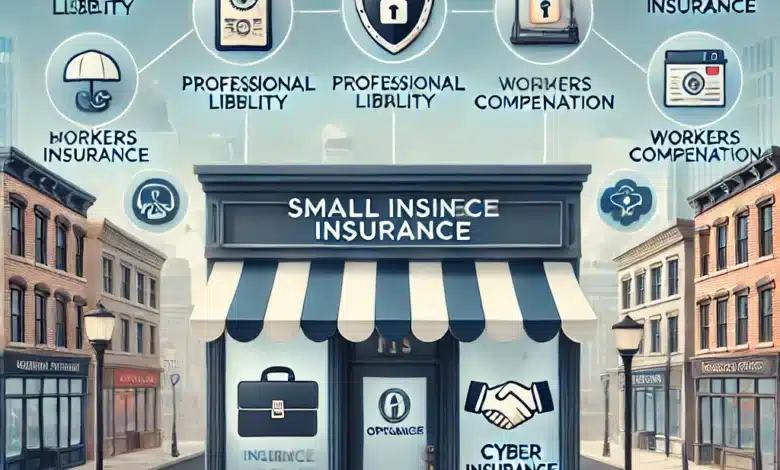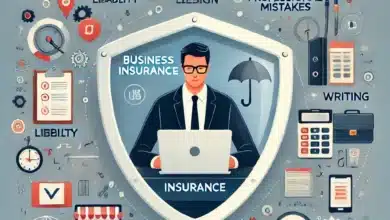9 Business Insurance Options for Small Businesses to Consider Today

Running a small business is an exciting journey filled with endless possibilities. However, it also comes with its fair share of risks. From unforeseen accidents to legal disputes, these challenges can make or break your enterprise. This is where the right business insurance options come into play. Protecting your business isn’t just about securing assets; it’s about ensuring peace of mind so you can focus on what truly matters—growing and thriving in today’s competitive market.
Understanding the various types of coverage available allows you to tailor a plan that meets your unique needs. Whether you’re looking for liability insurance or protection against cyber threats, there are numerous options tailored specifically for small businesses like yours. Let’s dive deeper into the essential types of business insurance every entrepreneur should consider!
The Importance of Business Insurance options for Small Businesses
Business insurance is crucial for small businesses, acting as a safety net against unexpected events. It safeguards your investment and provides financial security in times of crisis.
When accidents happen—be it a client injury or property damage—insurance helps cover the costs that could otherwise cripple your finances. This protection allows you to focus on growth without the constant worry of potential liabilities.
Additionally, having adequate coverage builds credibility with clients and partners. They feel more confident working with businesses that are insured, knowing there’s backup in case something goes awry.
Moreover, certain industries require specific forms of liability insurance by law. Keeping compliant not only protects you from fines but also enhances your reputation within your field.
In today’s unpredictable environment, business insurance is no longer optional; it’s an essential tool for sustainability and success.
General Liability Insurance
General liability insurance is a fundamental coverage for small businesses. It protects against claims of bodily injury, property damage, and personal injury.
Imagine a customer slips and falls in your store. Without this insurance, you could face hefty medical bills and potential lawsuits. This coverage steps in to handle those costs.
Additionally, it covers damages caused by your products or services. If something goes wrong after a sale, you won’t have to bear the financial burden alone.
Many clients expect proof of general liability before entering into contracts or agreements. Having this policy can strengthen client relationships and enhance credibility.
This type of insurance is often affordable but crucial for long-term stability. With the right protection in place, small business owners can focus on growth rather than worrying about unforeseen mishaps.
Professional Liability Insurance
Professional Liability Insurance, often referred to as errors and omissions insurance, is essential for businesses that provide services. This type of coverage protects against claims arising from negligent acts, mistakes, or failures in service delivery.
Whether you’re a consultant, lawyer, or healthcare provider, having this insurance can shield you from costly legal battles. Clients may sue for perceived inadequacies in your work or advice. Without proper coverage, defending these claims can drain both time and resources.
This insurance not only covers legal fees but also any settlements awarded if the claim is found valid. It helps maintain your business’s reputation by showing clients you take responsibility seriously.
Consider assessing your specific industry needs when exploring professional liability options. Tailoring the policy to fit your services ensures better protection against potential lawsuits and enhances trust among clients.
Property Insurance
Property insurance is a vital component of any small business’s risk management strategy. It protects your physical assets, including buildings, equipment, and inventory, from unforeseen events like fire, theft, or natural disasters.
Imagine losing everything due to a sudden incident. That’s where property insurance steps in to shield you financially. This coverage ensures that you can repair or replace damaged property without crippling your operations.
Different policies may offer varying levels of protection. Some cover just the building itself while others encompass contents as well. It’s essential to evaluate what specific risks your business faces.
Investing in the right property insurance allows peace of mind for small business owners. You can focus on growth rather than worrying about potential losses impacting your livelihood. The right policy will safeguard not just assets but also the future of your enterprise.
Workers’ Compensation Insurance
Workers’ compensation insurance is crucial for small businesses. It provides financial protection if employees get injured or fall ill while on the job.
This type of coverage helps to pay for medical expenses and lost wages, ensuring that your team can focus on recovery rather than worrying about finances.
For small business owners, it also serves as a shield against lawsuits related to workplace injuries. Without this insurance, you could face significant out-of-pocket costs that might threaten your operations.
Every state has its own regulations regarding workers’ comp requirements. Understanding these rules ensures compliance and protects both employees and employers alike.
Investing in workers’ compensation not only safeguards your workforce but also cultivates a positive work environment where employees feel valued and protected.
Commercial Auto Insurance
Commercial auto insurance is essential for businesses that use vehicles for their operations. Whether you have a single delivery van or a fleet of trucks, protecting your assets is crucial.
This type of insurance covers damages resulting from accidents involving company-owned vehicles. It often includes liability coverage, which protects against claims made by third parties injured in an accident caused by one of your drivers.
Additionally, commercial auto policies can cover theft and vandalism. If a vehicle gets damaged due to unforeseen circumstances, repairs can be costly without the right coverage in place.
It’s not just about protection; having commercial auto insurance builds trust with clients and partners. They see that you prioritize safety and responsibility on the road, reflecting well on your brand’s reputation.
Evaluating how many vehicles you operate will help determine the level of coverage needed to safeguard your business effectively.
Cyber Liability Insurance
In our digital age, the threat of cyberattacks looms large for small businesses. Cyber liability insurance is designed to protect against these risks. This coverage helps mitigate financial losses caused by data breaches and other online threats.
With sensitive customer information at stake, the consequences of a breach can be devastating. Legal fees, notification costs, and potential settlements could drain your resources quickly.
Moreover, the right policy can cover expenses related to restoring compromised systems and public relations efforts after an incident. Having this type of insurance not only provides peace of mind but also demonstrates to clients that you take their security seriously.
As cyber threats evolve rapidly, investing in cyber liability insurance has become essential for any small business looking to safeguard its future.
Product Liability Insurance
Product Liability Insurance protects businesses from claims related to the products they sell. If a product causes harm or injury, this coverage steps in to handle legal fees and settlements.
For manufacturers, distributors, and retailers alike, having this insurance is crucial. A simple defect can lead to lawsuits that drain resources quickly.
Even if you believe your product is safe, accidents can happen. Customers may have different experiences than expected. This unexpected risk makes product liability insurance an essential layer of protection for any small business dealing with physical goods.
It also covers various scenarios—design flaws, manufacturing errors, or inadequate warnings about potential risks. Without proper coverage, a single claim could put a significant financial strain on your operations.
Investing in product liability insurance not only safeguards your assets but also builds trust with customers who value safety and quality assurance.
Business Interruption Insurance
Business Interruption Insurance is a crucial safety net for small businesses. It helps cover lost income when operations are halted due to unforeseen events.
Imagine a fire damaging your storefront. While property insurance covers repairs, what about the revenue you lose during downtime? This type of insurance steps in to fill that gap.
It can also cover fixed expenses like rent and utilities, ensuring your business remains stable even when challenges arise.
Having this coverage means peace of mind, allowing you to focus on recovery rather than financial strain. It’s an essential part of risk management for any small business owner looking to safeguard their livelihood against unexpected disruptions.
How to Choose the Right Business Insurance for Your Small Business
Choosing the right business insurance for your small business can feel overwhelming. Start by assessing your specific needs. Consider the nature of your industry and potential risks you might face.
Next, evaluate different coverage options. General liability insurance is essential for most businesses, but specialized policies like cyber liability or product liability may be crucial depending on what you offer.
Consult with an insurance broker who understands small businesses. They can help clarify terms and find tailored solutions that suit your budget.
Don’t forget to review policy limits and deductibles carefully. Higher coverage limits often provide better protection, but they come at a cost.
Read customer reviews about insurers to gauge their reliability in handling claims. This step ensures you’re not just choosing based on price but also considering service quality when it matters most.
Conclusion
Choosing the right business insurance options is crucial for small businesses. With various types to consider, understanding your specific needs can help you make informed decisions. Each insurance type serves a unique purpose in protecting your assets and ensuring peace of mind.
It’s essential to assess the risks associated with your particular industry and operations. This evaluation will guide you in selecting the most suitable coverage. Consulting with an experienced insurance agent can also provide valuable insights tailored to your business model.
Investing in comprehensive liability insurance not only safeguards against unforeseen circumstances but also enhances credibility with clients and partners. By prioritizing proper coverage, you’re taking significant steps toward securing your business’s future while minimizing potential financial setbacks.
Stay proactive about reviewing and updating your policies as needed, keeping pace with any changes within your business or industry landscape. Protection through strategic planning is key to thriving amidst uncertainties that may arise down the road.





